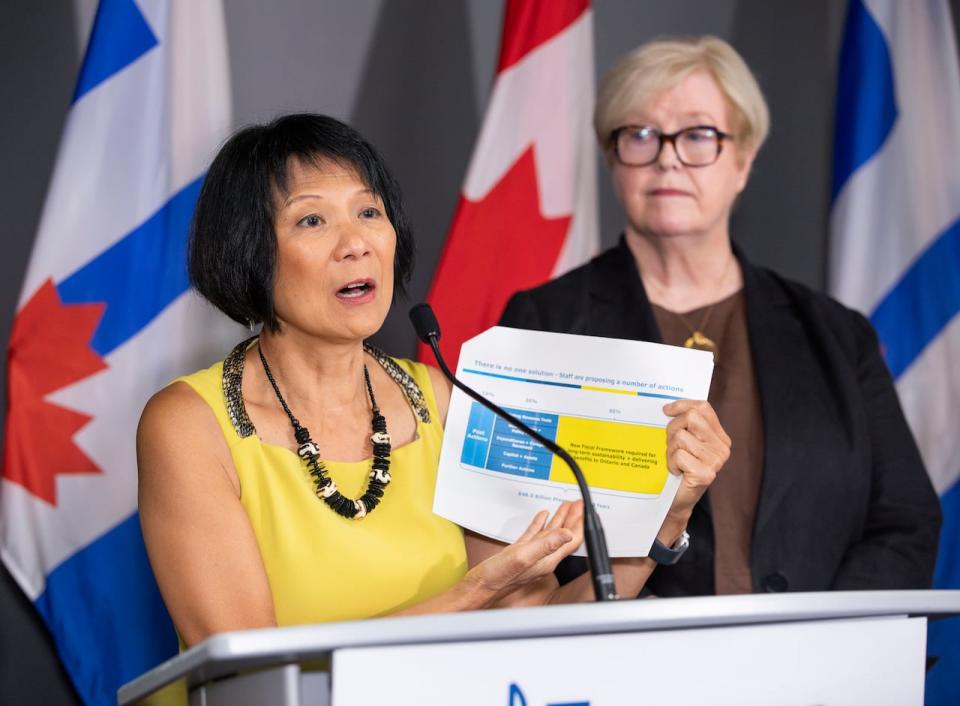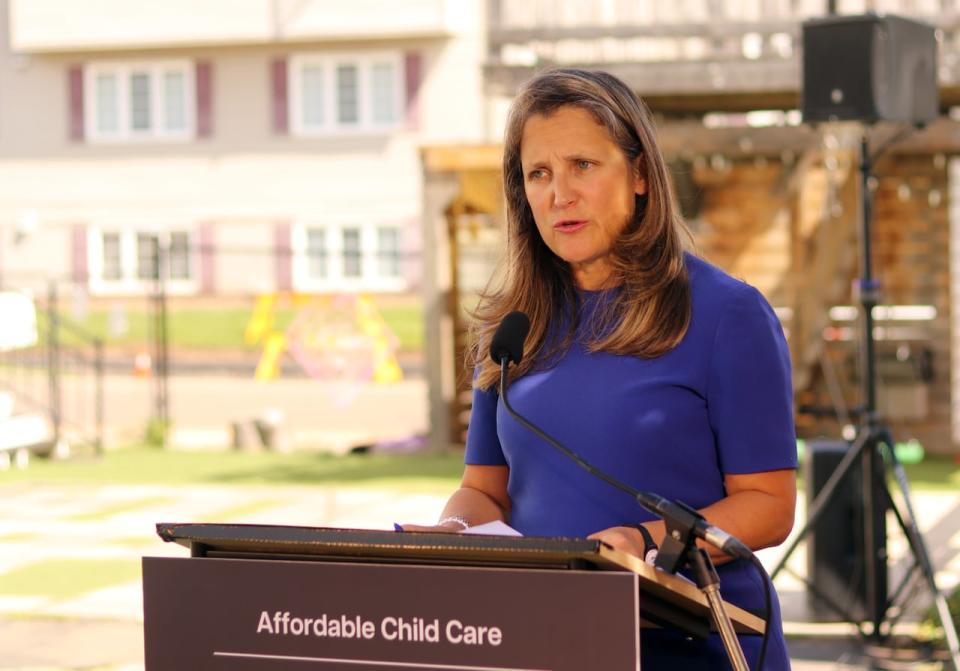Toronto council approves new measures to deal with grim financial situation

Toronto city council approved new revenue tools on Wednesday to address the city's grim financial situation as it faces $1.5 billion in budget pressures.
At a special meeting, councillors passed measures to increase municipal land transfer tax rates for homes valued at $3 million or higher and to remove the cap on $5/hour street parking. The land transfer tax increase for luxury homes is set to take effect Jan. 1, 2024.
Councillors also decided to direct city staff to report back on plans to implement a foreign buyer land transfer tax, introduce a commercial parking levy and increase the vacant home tax from one to three per cent.
In addition, councillors decided to ask the Ontario government to allow the city to implement a municipal sales tax and/or a cut of the existing harmonized sales tax. Such a tax could generate as much as $1 billion per year for the city. That tax, which would be applied to the purchase of goods and services in Toronto, would require provincial approval and an amendment of the City of Toronto Act.
Toronto Mayor Olivia Chow urged councillors to work together to address the financial crisis. Her executive committee endorsed the plan late last month.
"We know that we are stronger together," she said during a news conference before the debate. "And there's no dispute that every councillor understands that the City of Toronto is in a budget deficit situation."
Coun. Jennifer McKelvie, who represents Ward 25, Scarborough-Rouge Park, told council that the city cannot rely on current revenue tools to fund its programs and services.
"It's just not sustainable to fund cities using only property taxes. It's clear that Toronto needs a new fiscal framework with the provincial and the federal governments," she said. "We can't draw on our reserves. That's like taking out of our RRSPs to pay for our groceries."
Coun. Stephen Holyday, who represents Ward 2, Etobicoke Centre, for his part, expressed opposition to the municipal sales tax.
"I think it's abominable that we would be considering a municipal sales tax," he said.
As for the graduated municipal land transfer tax rate, a 3.5 per cent tax would be applied to homes valued at more than $3 million up to $4 million. A 4.5 per cent tax would be applied to homes valued at more than $4 million up to $5 million, a 5.5 per cent tax to homes valued at more than $5 million up to $10 million, a 6.5 per cent tax to homes valued at more than $10 million up to $20 million, and a 7.5 per cent tax would be applied to homes valued at more than $20 million.
Toronto budget pressures are projected to grow to $46.5 billion in operating and capital shortfalls over the next decade.
Council must do 'what we can' to address crisis: Chow
Chow said the city needs the help of the province and federal government to address its financial crunch. However, she said, it also needs to signal to other levels of government that it's doing its part to address the crisis.
"We need to have good working relationships with other levels of government," she said. "But prior to that, we need to come to the table with what we can do, what's within our power to do, and that's what's laid out in front of councillors."
A staff report presented to council details measures that will take time to investigate and implement.
On Tuesday, Chow pointed to increases to the land transfer tax on luxury homes as something that will have no impact on people struggling to make ends meet.
"If you look at the solutions in front of people tomorrow at council, the one that we are enacting immediately is called a 'mansion tax,'" she said. "It is for people that are buying homes that are luxury homes, that are expensive."
City staff say that measure could raise $26 million per year.
Sales tax won't work: Pasternak
As for the municipal sales tax, some councillors spoke out against the measure before the meeting. Coun. James Pasternak, who represents York Centre, Ward 6, said the sales tax will hurt people at a time when many are struggling with the increasing cost of living.
"A made-in-Toronto sales tax, it just won't work," he said. "People will shop elsewhere, they will leave our jurisdiction and shop at retail stores outside of Toronto."
But Pasternak agreed that upper levels of government need to come to the table with more support for the city. The province and federal government should give municipalities, including Toronto, a share of existing harmonized sales tax revenues, he said.
"We're generating billions of dollars of economic activity in taxation for the other two levels of the government," Pasternak said. "To ask for some of that back through a transfer, as a portion of the sales tax, I think that's a reasonable request."
It isn't immediately clear if the province would approve a municipal sales tax for Toronto. Asked recently if the province would allow the city to levy the fee, a spokesperson for the premier's office did not answer directly.
"Our government is focused on keeping costs down for people, especially at a time when the cost of living is going up," Caitlin Clark said in a statement.

Chrystia Freeland, Canada's deputy prime minister, speaks to reporters in Moncton, N.B., on Aug. 29, 2023. (Shane Magee/CBC)
Feds have rejected recent calls for financial help
The federal government has been cool to Toronto's recent requests for financial aid.
In 2022, the Liberal government rejected calls for help from former Mayor John Tory. Then, in July, Deputy Prime Minister Chrystia Freeland rejected another request — this one from Mayor Chow — for hundreds of millions of dollars in financial support for Canada's biggest city.
In a letter sent to Chow, Freeland said the federal government had contributed over $6 billion to the city since it was first elected in 2015. And if further help is needed, Toronto should either pull money from its reserve accounts or approach Premier Doug Ford's provincial government.
"The ability of the federal government to spend is not infinite — and the emergency support we provided during the pandemic led directly to the excellent fiscal position that the province of Ontario currently enjoys," Freeland wrote at the time.
Council approves ask to feds for $750K to help asylum seekers
Despite past rejections, Chow introduced a new motion to again ask the federal government for more funding, this time citing city's overburdened shelter system.
Council approved the motion — with a deadline of Sept. 18 — and also approved a plan that it pull from reserve funds to bolster its shelter system in the event that Ottawa doesn't provide more money. A further $750,000 would go toward compensating churches and community organizations that have stepped up to house asylum seekers.
A secondary motion asked city staff to publish regular data about the origins of city shelter users.
Chow says refugee claimants could account for half of the city's homeless shelter population by the end of the year, a situation she called "desperate" as she pressed Ottawa for immediate support.


